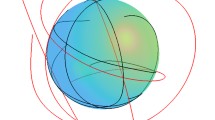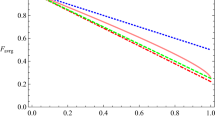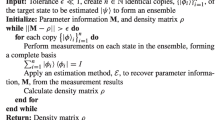Abstract
A pure multi-qubit state is called absolutely maximally entangled if all reduced states obtained by tracing out at least half of the particles are maximally mixed. Recently, Felix Huber proved that the absolutely maximally seven-qubit entangled state does not exist. In this letter, we investigate the relation of reduced density matrix and the local unitary transformation invariants of four- and eight-qubit entangled states. Using some constraint conditions, for four- and eight-qubit states, we can prove that absolutely maximally entangled states do not exist.
Similar content being viewed by others
References
Bennett, C.H., Brassard, G., Claude, C., et al.: Teleporting an unknown quantum state via dual classical and Einstein-Podolsky-Rosen channels. Phys. Rev. Lett. 70, 1895 (1993)
Ekert, A.K.: Quantum cryptography based on Bell’s theorem. Phys. Rev. Lett. 67, 661 (1991)
Kempe, J.: Multiparticle entanglement and its applications to cryptography. Phys. Rev. A 60, 910 (1999)
Facchi, P., Marzolino, U., Parisi, G., et al.: Phase transitions of bipartite entanglement. Phys. Rev. Lett. 101, 050502 (2008)
Leibfried, D., Knill, E., Seidelin, S., et al.: Creation of a six-atom ‘Schrdinger cat’ state. Nature 438, 639 (2005)
Monz, T., Schindler, P., Barreiro, J.T., et al.: 14-Qubit entanglement: Creation and Coherence. Phys. Rev. Lett. 106, 130506 (2011)
Coffman, V., Kundu, J., Wotters, W.K.: Distributed entanglement. Phys. Rev. A 61, 052306 (2000)
Verstraete, F., Dehaene, J., De Moor, B.: Normal forms and entanglement measures for multipartite quantum states. Phys. Rev. A 68, 012103 (2003)
Scott, A.J.: Multipartite entanglement, quantum-error-correcting codes, and entangling power of quantum evolutions. Phys. Rev. A 69, 052330 (2004)
Facchi, P., Florio, G., Parisi, G., et al.: Maximally multipartite entangled states. Phys. Rev. A 77, 060304(R) (2008)
Kraus, B.: Local unitary equivalence of multipartite pure states. Phys. Rev. Lett. 104, 020504 (2010)
Chitambar, E., Cui, W., Lo, H.K.: Increasing entanglement monotones by separable operations. Phys. Rev. Lett. 108, 240504 (2012)
de Vicente, J.I., Spee, C., Kraus, B.: The maximally entangled set of multipartite quantum states. Phys. Rev. Lett. 111, 110502 (2013)
Zha, X.W., Yuan, C.Z., Zhang, Y.P.: Generalized criterion for a maximally multi-qubit entangled state. Laser Phys. Lett. 10, 045201 (2013)
Zhao, J.Y., Zhao, H., Jing, N.H., et al.: Detection of genuine multipartite entanglement in multipartite systems. Int. J. Theor. Phys. 58, 3181 (2019)
Goyeneche, D., Zyczkowski, K.: Genuinely multipartite entangled states and orthogonal arrays. Phys. Rev. A 90, 022316 (2014)
Goyeneche, D., Alsina, D., Latorre, J.I., et al.: Absolutely maximally entangled states, combinatorial designs, and multiunitary matrices. Phys. Rev. A 92, 032316 (2015)
Wu, Z.K., Wang, Z.P.: Optical vortices in the Ginzburg-Landau equation with cubic-quintic nonlinearity. Nonlinear Dyn. 94, 2363 (2018)
Wu, Z.K., Wang, Z.P., Guo, H., et al.: Self-accelerating Airy Laguerre-Gaussian light bullets in a two-dimensional strongly nonlocal nonlinear medium. Opt. Express 25, 30468 (2017)
Zhang, Y.G., Wu, Z.K., Ru, J.M., et al.: Evolution of the Bessel-Gaussian beam modeled by the fractional schrödinger equation. J. Opt. Soc. A. B 37, 3414 (2020)
Huber, F., Gühne, O., Siewert, J.: Absolutely maximally entangled states of seven qubits do not exist. Phys. Rev. Lett. 118, 200502 (2016)
Eltschka, C., Siewert, J.: Distribution of entanglement and correlations in all finite dimensions. Quantum 2, 64 (2018)
Acknowledgements
This work was not supported by any Funding.
Author information
Authors and Affiliations
Contributions
All authors contributed equally to this research or paper.
Corresponding author
Ethics declarations
Conflict of Interests
On behalf of all authors, the corresponding author states that there is no conflict of interest.
Additional information
Publisher’s Note
Springer Nature remains neutral with regard to jurisdictional claims in published maps and institutional affiliations.
Rights and permissions
About this article
Cite this article
Zhi, P., Hu, Y. Demonstrate Absolutely Maximally Entangled of Four- and Eight-qubit States Inexistence via Simple Constraint Condition. Int J Theor Phys 60, 3488–3493 (2021). https://doi.org/10.1007/s10773-021-04924-8
Received:
Accepted:
Published:
Issue Date:
DOI: https://doi.org/10.1007/s10773-021-04924-8




